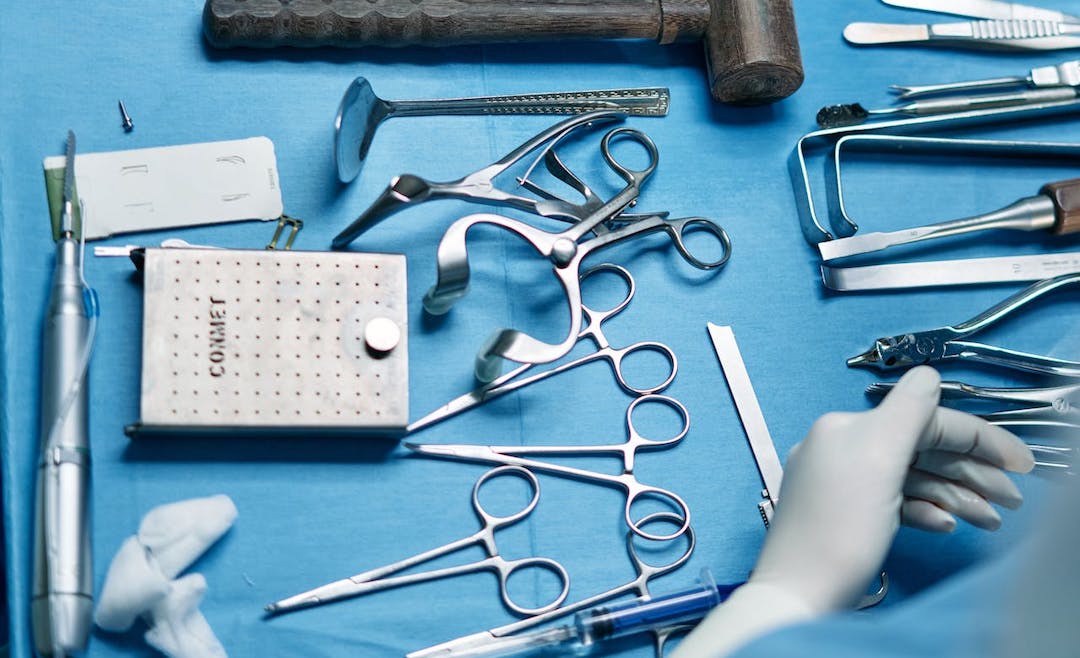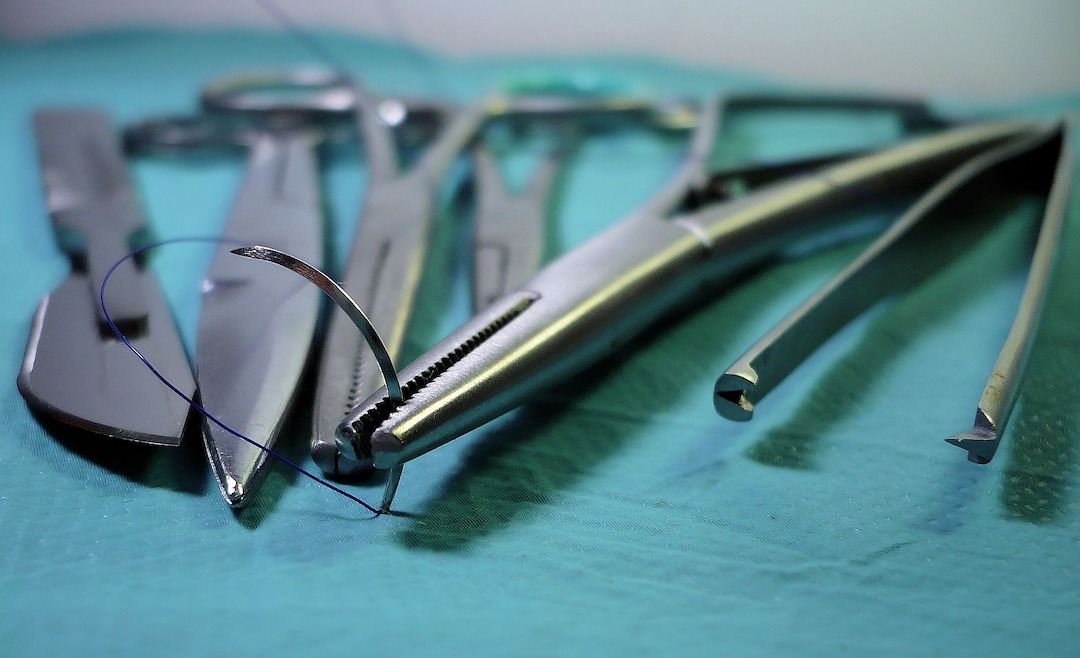Surgical technologists assist with surgeries and other procedures by organizing and sterilizing instruments, preparing patients for surgery, handling equipment, and cleaning rooms.
Benefits of working as a scrub tech include great job security, a decent salary, and job availability all over the United States.
Surgical techs most often work in hospitals, but can also work in outpatient centers, doctors’ offices, dentists’ offices, and in administrative roles.
This guide covers all the places surgical techs can work and what they do in each location.
5 Most Common Places Surgical Techs Work
When people think about where they will work after becoming a surgical technologist, a hospital operating room is probably the first place that comes to mind.
While this is the most common place for surgical techs to work, there are many other places where surgical techs work.
Here are the 5 most common places where surgical techs work, according to the Bureau of Labor Statistics:
1) Hospitals (State, Local, and Private)
Surgical techs working in hospitals spend most of their time in the operating room. Because surgeries can be so complex and there are so many different instruments to keep track of, many surgical technicians specialize and focus on one specific type of surgery.
Surgical techs working in a hospital may choose to focus on orthopedic, cardiothoracic, general, pediatric, or many other types of specific surgical suites.
- Percent of Jobs: 71% of all surgical techs in the United States work in hospitals.
- Average Salary: $56,600 per year
- Typical Hours: Monday through Friday, 7 am to 4 pm, with night and weekend on-call requirements
- Responsibilities: Prepare patients for surgery, gather and organize equipment, sterilize surgical instruments, hand tools to the surgeon, clean up after surgeries, and help monitor patient condition.
2) Outpatient Care Centers
In outpatient care centers, surgical technologists often assist with less invasive surgeries than in the hospital, but there are still plenty of procedures that can be done.
Outpatient surgical centers will not perform major cardiac or abdominal surgeries but can use conscious sedation or local anesthetic for orthopedic or cosmetic procedures.
- Percent of Jobs: 12% of all surgical techs in the United States work in outpatient care centers
- Average Salary: $58,930 per year
- Typical Hours: Monday through Friday, 7 am to 6 pm
- Responsibilities: Check patients in, measure vital signs, prepare equipment, sterilize instruments, apply simple bandages, clean and organize rooms, document procedures
3) Offices of Physicians
Surgical technologists can also work in physicians’ offices. Surgical techs working here assist with minor procedures and may also handle administrative tasks like scheduling appointments or dealing with insurance.
Surgical techs are most often needed in offices of dermatology, medical spas, and pain clinics.
- Percent of Jobs: 12% of all surgical techs in the United States work in offices of physicians
- Average Salary: $51,730 per year
- Typical Hours: 8 am to 6 pm, Monday through Saturday
- Responsibilities: Organize and order supplies, sterilize instruments, sanitize patient rooms, assist with procedures, apply ointments and bandages, document procedures, schedule appointments, and coordinate with insurance companies.
4) Administrative and Support Services
Some surgical techs choose to work in administrative and support services. There are administrative roles available in hospitals, offices of physicians and dentists, and insurance companies.
Administrative and support roles often require in-depth knowledge about how a surgical center operates and may require additional training in medical coding or billing.
- Percent of Jobs: 2% of all surgical techs in the United States work in administrative and support services
- Average Salary: $48,880 per year
- Typical Hours: 9 am to 5 pm, Monday through Friday
- Responsibilities: Manage physician and patient scheduling, deal with insurance claims, handle patient questions, take inventory of and order new supplies, input data, answer phone calls, and type and edit physician dictations.
5) Offices of Dentists
Dentist offices occasionally hire surgical techs to assist with procedures such as tooth extractions, root canals, and even routine fillings. Surgical techs in dentists’ offices perform many of the same responsibilities as those in outpatient centers and offices of physicians.
- Percent of Jobs: 1% of all surgical techs in the United States work in offices of dentists
- Average Salary: $44,990 per year
- Typical Hours: 8 am to 5 pm, Monday through Friday
- Responsibilities: Sterilize equipment, prepare patients for surgery, hold suction for the dentist, position the patient during procedures, measure vital signs, organize supplies, apply gauze and bandages, and clean rooms between patients.
How to Decide Which Location is Best for You as a Surgical Tech
When deciding which location is best for you as a surgical tech, there are a few important factors to consider.
1) Desired Work Environment
Think about the type of work environment you thrive in.
An operating room in a large hospital is more likely to be fast-paced and high-stress, where you will encounter frequent life-and-death situations.
Administrative jobs, on the other hand, are likely to be slower-paced, with predictable routines and little to no hands-on work with patients.
2) Types of Surgeries You Want to Help With
It is also important to consider what types of surgeries you want to help with.
Surgical techs in large hospitals may have opportunities to assist with invasive procedures like cardiac surgeries or major abdominal surgeries, while those in dentists' offices get to assist with root canals and orthodontic procedures.
Some surgical techs are more interested in assisting with cosmetic procedures, which can sometimes be done in an outpatient center, while others may want to assist with minor procedures like skin biopsies or suturing, which can be done in a physician’s office.
3) Desired Work Hours
While most surgical centers and offices operate during normal weekday business hours, hospital staff members almost always have to work during some nights, weekends, and holidays. While these shifts are considered undesirable, employees are usually paid a differential when they work these hours.
Hospital surgical techs usually have to be on-call during nights, weekends, and holidays, but they are paid well if they do have to come in.
4) Learning & Growth Opportunities
When choosing a job as a surgical tech, consider your future goals as well as your immediate needs.
Techs in hospitals may have more opportunities to experience different types of surgeries and work in different areas of the hospital. In addition, working in a hospital usually means assisting with more invasive surgeries and learning more advanced skills.
If you want to specialize, you may want to choose an outpatient center or physician’s office in your chosen field. Different office opportunities may include cosmetic surgeries, pediatric offices, dentist offices, or emergency services.
>> What’s the difference? Surgical Tech vs. Surgical Assistant
5) Available Jobs in Your Location
Unless you are willing to relocate or become a travel surgical tech, you may have to compromise to find good jobs near your home.
Consider whether there are public transportation options, how long you will spend on your commute, and the cost of relocating when looking for your dream job as a surgical technician.
Big cities are more likely to have hospitals that perform advanced surgeries, while rural areas may have more opportunities for surgical techs to work in physician or dentist offices.
>> Ready to take the next step? How to Become a Surgical Tech




.svg)












